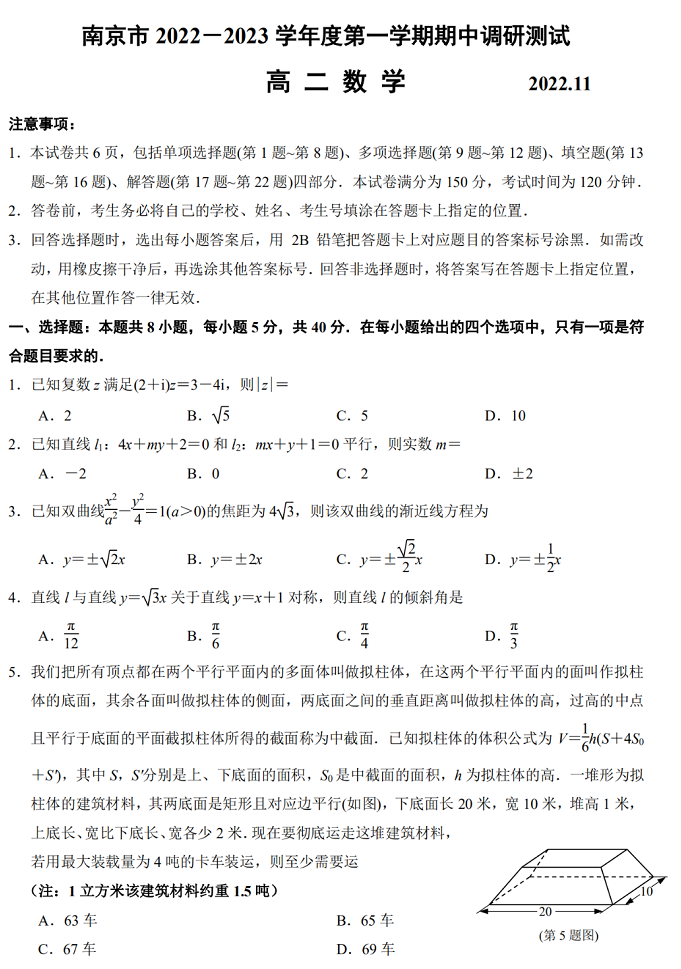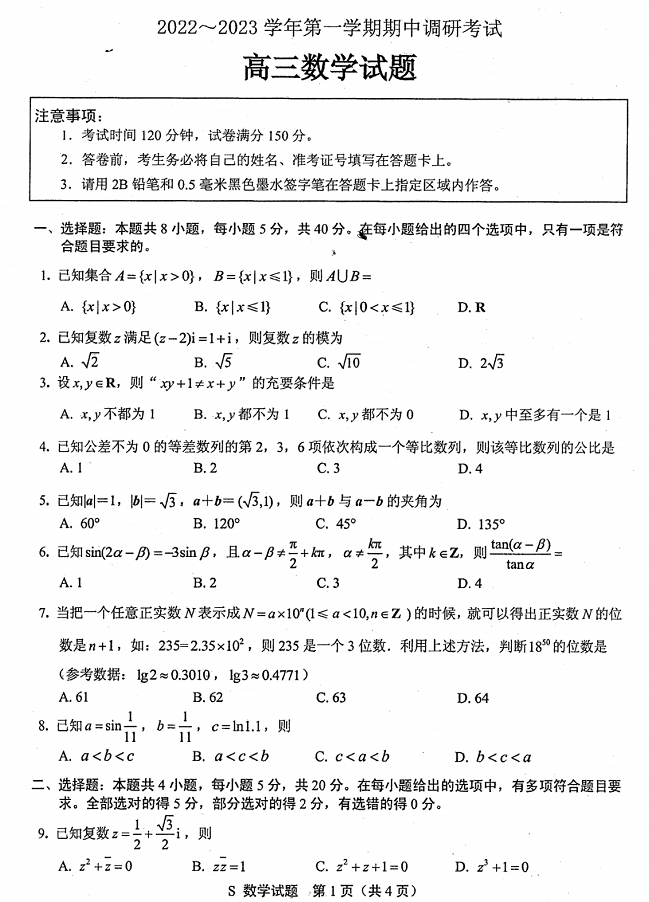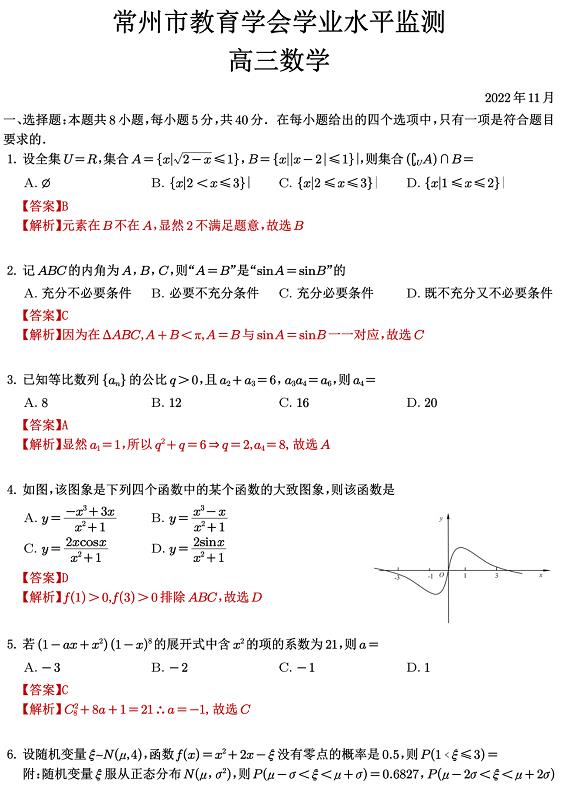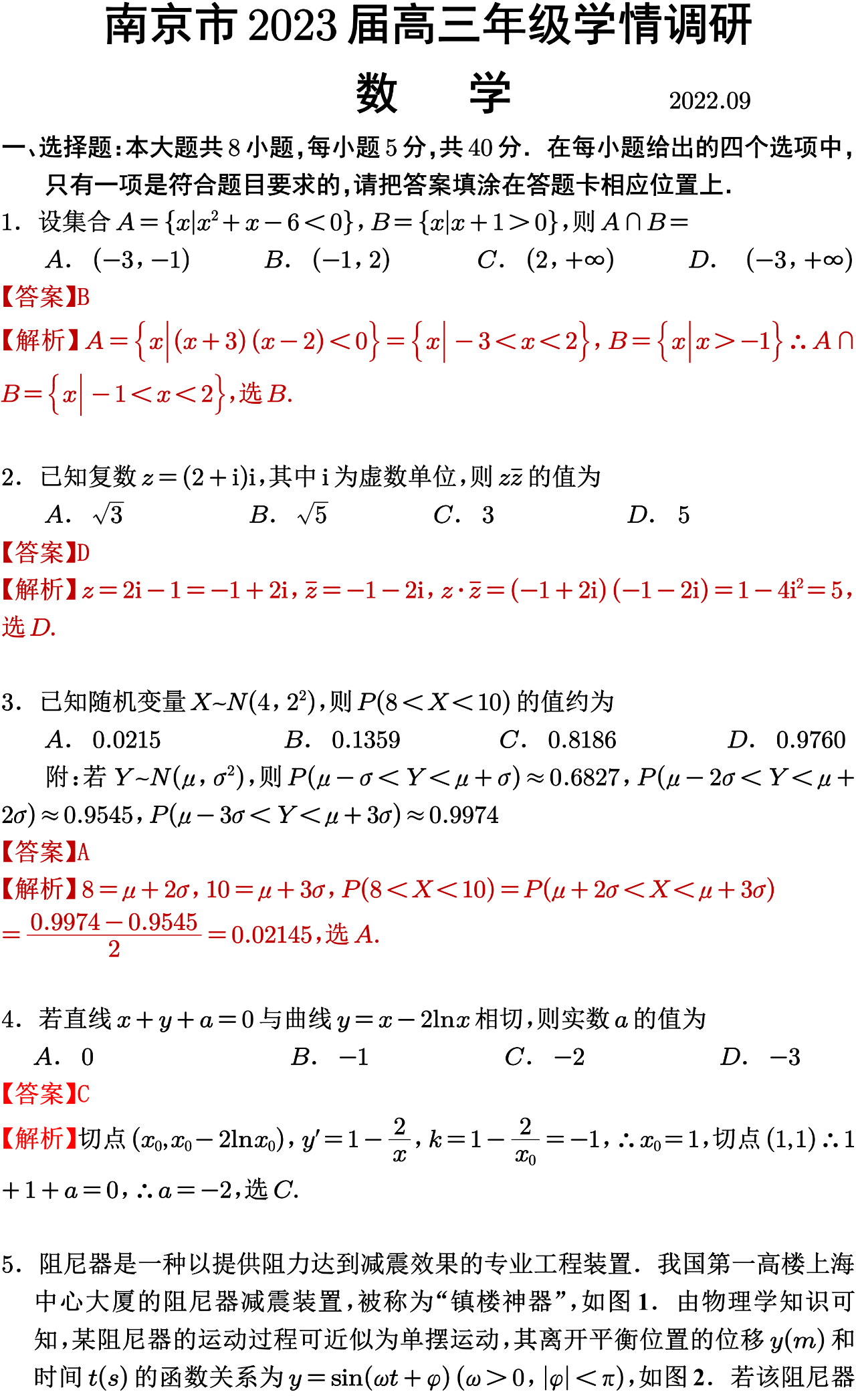天津市滨海七所环境好的学校2018届高三毕业班联考英语试题及参考答案
2018年天津市滨海七所环境好的学校高三毕业班联考英语考试已经结束了,同学们考完之后可以稍作休息,然后就要开始继续学习了,因为距离高考就仅剩下60多天了,时间是紧张的。伊顿教育小编第一时间整理出天津市滨海七所环境好的学校2018届高三毕业班联考英语试题及参考答案。

天津市滨海七所环境好的学校2018届高三毕业班联考英语试题
第I卷 选择题(共115分)
注意事项:
1.答第Ⅰ卷前,考生务必将自己的姓名、准考证号、考试科目用铅笔涂写在答题卡上。
2.选出答案后,用铅笔把答题卡上对应的题目的答案标号涂黑,如需改动,用橡皮擦干净后,再填涂其它答案。
第一部分:听力(共两节,20分)
第一节 (共5小题;每小题1分,5分)
听下面五段对话。每段对话后有一个小题,从题中所给的A、B、C三个选项中选出较佳选项,并标在试卷的相应位置。听完每段对话后,你将有10秒钟的时间来回答有关小题和阅读下一小题。每段对话仅读一遍。
1. What does the man plan to do?
A. Watch a show. B. Do an experiment. C. Attend a lecture.
2. How will the man probably go to Chicago?
A. By car. B. By plane. C. By bus.
3. What does the man mean?
A. Few people agree with his points.
B. Few people know about arts.
C. Few people read his article.
4. What do we know about Helen?
A. She is away traveling. B. She started a studio. C. She was fired.
5. How many tickets does the woman have?
A. 2. B. 3. C. 4.
#p#副标题#e#
第二节(共10小题;每小题1.5分,15分)
听下面几段材料。每段材料后有几个小题,从题中所给的A、B、C三个选项中选出较佳选项,并标在试卷的相应位置。听每段材料前,你将有时间阅读各个小题,每小题5秒钟;听完后,各小题将给出5秒钟的作答时间。每段材料读两遍。
听下面一段对话,回答第6至第8小题。
6. What is the relationship between the speakers?
A. Former schoolmates.
B. Theater group members.
C. Close friends.
7. How often does the man practice for every show?
A. Once a month. B. Once a week. C. Twice a week.
8. What will the speakers do next?
A. Attend a dance party. B. Have a meal. C. See a film.
听下面一段对话,回答第9至第11小题。
9. Why does the woman think the man wants to talk to her?
A. She spends too much time at work.
B. She is mean to her assistants.
C. She has done something wrong.
10. When did the woman start working with the man?
A. Six years ago. B. Two years ago. C. Six months ago.
11. Where are the speakers now?
A. In the woman’s house. B. At her son’s school. C. In the office.
听下面一段独白,回答第12至第15小题。
12. What is the first prize in the photo competition?
A. A two-week holiday.
B. A 500-pound camera.
C. Two plane tickets to Egypt.
13. What requirements do the photos need to meet?
A. They must be in color.
B. They must be taken on holidays.
C. They must show family life.
14. When can kids enter the sports competition?
A. In August. B. In September. C. In October.
15. What does the speaker remind the competitors to do?
A. Put their information down on the back of the photos.
B. Find out the result of the competition a month later.
C. Get their photos back after the competition.
#p#副标题#e#
第二部分:英语知识运用(共两节, 45分)
第一节:单项填空(共15小题; 每小题1分,15分)
从A、B、C、D四个选项中,选出可以填入空白处的较佳选项。
16. —May I help you? You seem to be having some problems.
— ______, thanks. I think I can manage.
A. All right B. No problem C. It’s all right D. There’s no way
17. —Are you coming to Jeff’s party?
—I’m not sure. I ______ go to the concert instead.
A. must B. would C. should D. might
18. ______ he was 12, Einstein had learned advanced mathematics by himself.
A. The first time B. At the time C. By the time D. During the time
19. The guidance teacher was their adviser, offering them suggestions and solutions when they ______ difficulties.
A. arose B. encountered C. emerged D. evaluated
20. The police officers decided to conduct a thorough and ______ review of the case.
A. comprehensive B. complicated C. conscious D. constant
21. Jane’s grandmother had wanted to write ______ children’s book for many years, but one thing or another always got in ______ way.
A. a; 不填 B. the; the C. 不填; the D. a; the
22. — Is Peter coming?
— No, he ______ his mind after a phone call at the last minute.
A. changes B. changed C. was changing D. had changed
23. “Made in China 2025” aims to transform China from a product-making factory into
a product-making power, ______ driven by innovation and emphasizing quality over quantity.
A. the one that B. one that C. one D. the one
24. Creating an atmosphere ______ employees feel part of a team is a big challenge.
A. where B. whose C. that D. which
25. It was ______ we were returning home ______ I realized what a good feeling it was to have helped someone in trouble.
A. when; before B. when; that C. before; where D. how; that
26. I went to the classroom as usual. But there, next to my desk, ______ I had never seen before.
A. a girl did sit B. a girl sat C. did a girl sit D. sat a girl
27. Nowadays, more and more Chinese homes have the technology and equipment ______ to do online shopping.
A. needed B. needing C. need D. to need
28. There are various things on sale, so you can choose ______ interests you.
A. whoever B. no matter who C. whatever D. no matter what
29. We arranged to meet at the cinema at 7:30, but Jack failed to ______.
A. break up B. set up C. turn up D. give up
30. But for your instruction, I ______ such great progress in so short a time. Thanks a lot.
A. wouldn’t make B. hadn’t made
C. won’t make D. wouldn’t have made
#p#副标题#e#
第二节:完形填空(共20小题; 每小题1.5分,30分)
阅读下面短文,掌握其大意,然后从31-50题所给的A、B、C、D四个选项中,选出较佳选项。
I was standing in the checkout line behind a woman who looked to be in her 60s. When it was her turn to pay, the cashier(收银员) 31 her by name and asked her how she was doing. The woman looked down, shook her hand and said, “Not so good. My husband just lost his job and my 32 son is up to his old tricks again. The truth is, I don’t know how I’m going to 33 the holidays.” Then she gave the cashier food stamps.
My heart 34 . I wanted to help but didn’t know how. Should I offer to 35 her groceries or ask for her husband’s situation?
36 I walked into the parking lot, I spotted the woman returning her shopping cart. I remembered something in my purse that I thought might help her. It wasn’t a handful of cash or an 37 of a job for her husband, but maybe it would make her life 38 .
My heart beat faster as I 39 the woman. “Excuse me,” I said, my voice trembling a bit. “I couldn’t help overhearing what you said to the cashier. It sounds like you’re going through a really 40 time right now. I’m so sorry, but I’d like to give you something.”
I took a small card out of my purse and 41 it to her.
When the woman read the card’s only two words, she began to cry. And through her 42 , she said, “You have no idea how much this 43 to me.”
I was a little 44 by her reply. Having never done anything like this before, I didn’t know what kind of 45 I might receive. All I could think to respond was, “Oh! Would it be OK to give you a 46 ?”
After we hugged 47 , I walked back to my car — and began to cry too.
The words on the card?
“You Matter.”
A few weeks earlier, a colleague gave me a similar card as 48 for a project I was working on. When I read the card, I felt a 49 glow (喜悦) spread inside of me. Deeply touched, I came home and ordered my own box of You Matter cards and started 50 them.
31. A. charged B. greeted C. recognized D. heard
32. A. confident B. independent C. hopeless D. stubborn
33. A. think about B. give up C. go on D. get through
34. A. ached B. failed C. beat D. paused
35. A. send for B. provide for C. pay for D. beg for
36. A. As B. Though C. Unless D. Since
37. A. excuse B. offer C. experience D. opinion
38. A. harder B. wealthier C. simpler D. better
39. A. touched B. found C. passed D. approached
40. A. happy B. tough C. regular D. long
41. A. handed B. showed C. spread D. explained
42. A. thanks B. fears C. tears D. beliefs
43. A. brings B. means C. values D. contains
44. A. worried B. excited C. moved D. shocked
45. A. reaction B. feeling C. expression D. answer
46. A. present B. promise C. hug D. ride
47. A. wildly B. tightly C. anxiously D. eagerly
48. A. progress B. effort C. encouragement D. praise
49. A. warm B. rich C. soft D. fierce
50. A. gathering B. enjoying C. preparing D. sharing
#p#副标题#e#
第三部分:阅读理解(共20小题;每小题2.5分,50分)
阅读下列短文,从每题所给的A、B、C、D四个选项中,选出较佳选项。
A
Information on Travelling in Singapore
Money matters
The currency in Singapore is the Singapore dollar(S$). Money changing services can be found at many shopping centres and hotels around the island, and the ATMs(generally open 24/7) accept most of the main credit cards such as Visa, MasterCard and American Express.
Hotel Reservations and Accommodation
Upon arrival at the airport, please visit its 24-hour hotel reservations counters, which can help get you a room in your preferred hotel. Payment for the first night is required upon confirmation.
Lost Passport/Singapore Immigration Services
Should you lose your passport, we suggest you make a police report, then head to the Immigration & Checkpoints Authority to get a temporary visa. Finally, inform your respective embassy so that you can get through customs when you reach home.
Tipping
Tipping is not a common practice in Singapore as most hotels and restaurants include a 10% service charge in the final bill. While tipping is not expected, it is appreciated, be it in restaurants where there is no service charge, or anywhere where excellent service is provided.
Smoking
If you are a smoker, you will have to resist the urge to light up in air-conditioned areas such as shopping centres, restaurants, entertainment outlets and cinemas. Smoking is also an offence in public buses, the MRT trains, taxis and lifts. A maximum of S$1000 can be imposed on first-time offenders. A general rule of thumb is that if there is an ashtray supplied, go for it.
51. Which of the following words can be used to describe the money changing system in Singapore?
A. Difficult. B. Convenient. C. Traditional. D. Original.
52. What is essential if you want to book a hotel room at the airport?
A. You must stay in Singapore for 24 hours.
B. You should go to your preferred hotel.
C. You are supposed to pay for the first night.
D. You must spend the first night at the airport.
53. How many steps are suggested that you should follow if you lose your passport in Singapore?
A. 2. B. 3. C. 4. D. 5.
54. On which of the following occasions are you expected to tip?
A. When you think that the service is very good.
B. When you receive a gift from a friend.
C. When you leave a very good restaurant.
D. When you are faced with any difficulty.
55. Smoking is strictly forbidden in the following areas EXCEPT ______.
A. in an air-conditioned restaurant B. in a bus
C. in a conference room D. by an ashtray
#p#副标题#e#
B
Frank Lloyd Wright was the champion of organic architecture, a style of building meant to harmonize with nature. But I’m not sure harmonizing with chipmunks — small American animals similar to squirrels with black lines on their fur — was what he had in mind.
During my years with the US National Park Service, I spent six months working in a visitor center designed by Wright’s firm. Several other employees and I staffed the park’s phone and radio system from a room in the basement.
I was sitting at my desk when I first heard a sound in the suspended ceiling. Dark shapes moved fast across the light panel(光板) above my head. Moments later, they ran back in the opposite direction, leaving me with an impression of noses and tails, each tail followed by another nose. It was like watching a shadow puppet(皮影) performance, but with real animals.
“Baby chipmunks,” a fellow told me. “They live in the ceiling.”
After four summers working in the parks, I had grown accustomed to sharing indoor space with wildlife. Chipmunks in the workplace even seemed to be a joy; their behaviors provided a bit of stress relief on difficult days.
As summer progressed, the shadows chasing each other across our lights grew bigger. Their movement across the light panels had become more of an athletic running.
I had just answered a call one day when I heard a loud sound, and a ceiling panel fell down on my head. I dropped the phone as I fell out of my office chair, looking up just in time to see a brown tail disappear over the gap in the ceiling.
I pulled myself off the carpet, laughing with my co-workers, and noticed the phone hanging over the side of the desk. I picked up the phone, preparing to explain the crash, the scream, the dropped phone, and the laughing to the listener who was about to visit the park.
“I’m sorry, but you’re not going to believe what just happened.”
I don’t think he did.
56. What does the author probably do?
A. He’s a visitor. B. He’s a biologist.
C. He’s an architect. D. He’s a consultant.
57. What were the chipmunks doing when the author found them for the first time?
A. They were chasing each other.
B. They were making their home.
C. They were jumping onto the lights.
D. They were climbing up to the ceiling.
58. How did the author feel about seeing chipmunks in his office?
A. Scared. B. Curious. C. Pleased. D. Shocked.
59. What was the main cause of the accident when the author was making a phone call?
A. The chipmunks were fighting on the panel.
B. The panel couldn’t bear the chipmunks’ weight.
C. Something hit the ceiling from high above.
D. The suspended ceiling was not firm.
60. Who was the author talking to over the phone?
A. One of his friends. B. Frank Lloyd Wright.
C. A future park visitor. D. One of his colleagues.
#p#副标题#e#
C
By trying to tickle(挠痒痒) rats and recording how their nerve cells respond, Shimpei Ishiyama and his adviser are discovering a mystery that has puzzled thinkers since Aristotle expected that humans, given their thin skin and unique ability to laugh, were the only ticklish animals.
It turns out that Aristotle was wrong. In their study published on Thursday, Ishiyama and his adviser Michael Brecht found that rats squeaked and jumped with pleasure when tickled on their backs and bellies. These signs of joy changed according to their moods. And for the first time, they discovered a special group of nerve cells. These nerve cells made this feeling so powerful that it causes an individual being tickled to lose control.
To make sure that he had indeed found a place in the brain where tickling was processed, Ishiyama then stimulated(刺激) that area with electrical currents. The rats began to jump like rabbits and sing like birds.
“It’s truly ground-breaking,” said Jeffrey Burgdorf, a neuroscientist at Northwestern University who reviewed the paper. “It takes the study of emotion to a new level.”
Burgdorf has played a central role in our understanding of animal tickling. He was part of a team that first noticed, in the late 1990s, that rats made special noises when they were experiencing social pleasure. Others had already noted that rats repeatedly made short and high sounds during meals. But the lab where Burgdorf worked noticed that they emitted similar sounds while playing. And so one day, the senior scientist in the lab said, “Let’s go and tickle some rats.” They quickly found that those cries of pleasure doubled.
“The authors have been very adventurous,” said Daniel O’Connor, a neuroscientist at Johns Hopkins University who studies touch. To him, that finding was very surprising.
“Why does the world literally feel different when you are stressed out?” he said. “This is the first step towards answering that question. It gives us a way to approach it with experimental rigor(严谨).”
61.What contributed to humans’ being ticklish according to Aristotle?
A. Their special skin. B. Their social pleasure.
C. Their nervous system. D. Their willingness to touch.
62.Why did the researchers make use of electrical currents?
A. To discover the special group of nerve cells.
B. To experiment on different animals.
C. To follow the process of tickling.
D. To prove their finding.
63.Which of the following statements will Jeffrey Burgdorf agree with?
A. The research process is full of risks.
B. The finding of the study is surprising and unbelievable.
C. The new discovery is beneficial for the study of emotion.
D. The finding of the study actually contradicts modern science.
64. The underlined word “squeak” in Paragraph 2 may be explained by ______.
A. give a smile B. make a noise C. burst into tears D. watch with staring eyes
65.What is the best title for the text?
A. The Life of Rats B. How Rats Laugh
C. A Wonderful Scientist D. A New Discovery about Rat
#p#副标题#e#
D
My newlywed husband said the same thing every morning. “You're beautiful today.”
One glance in the mirror showed that it was far from the truth.
“Liar,” I shot back with a grin.
It was my usual response. My mother's first husband was not a kind man and his verbal (语言的) and physical abuse forced her and her two children to find a safe place. He showed up on her doorstep one day with roses. She let him in and he beat her with those roses and took advantage of her. Nine months later she gave birth to a 9 lb. 13oz. baby girl -- me.
The rude words we heard growing up took root. I had trouble seeing myself as someone of value. I had been married two years when I surprised myself. My husband wrapped his arms around me and told me I was beautiful.
A lot of years have passed. My husband has grey in his hair. I'm no longer skinny. Last week I woke up and my husband's face was inches from mine.
“What are you doing?” I asked.
I covered my mouth, trying to hide my morning breath. He reached down and kissed my face.
“What I do every morning,” he said.
What a man! My husband understands my past. He's been beside me as I've grown from an unsure young girl to a confident woman, mother, speaker and author.
But I'm not sure that he understands the part he played in that transformation. The words I heard growing up pierced(刺穿) my soul, yet his words pierced even deeper.
This Anniversary Day I plan to wake early. I want to tell Richard how much I love him. He may look in the mirror and see an extra pound or two, or wish for the day when his hair was dark and curly, but all I'll see is the man who saw something in me when I couldn't see it myself, and who leaves butterfly kisses, even after twenty-three years of marriage.
66. When the author looked into the mirror, she found herself ______.
A. beautiful B. confident C. untidy D. unusual
67. Why did the author’s mother and her two children have to move?
A. Because their house was too small.
B. Because they were not well treated by the husband.
C. Because they were expecting another baby.
D. Because her mother’s husband wanted them to move.
68. As a young girl, the author ______.
A. was married early B. had a happy childhood
C. looked for root everywhere D. lacked confidence in herself
69. It can be inferred from the passage that ______.
A. the author’s husband had a positive influence on her life
B. the author played an important part in the change
C. they have been married for 23 years
D. the author’s husband has gained some weight
70. The underlined phrase “the words” in the last but one paragraph refers to ______.
A. her own words B. her husband’s words
C. her mother’s words D. her father’s words
#p#副标题#e#
第Ⅱ卷 ( 非选择题 )
第一节:阅读表达(共5小题;每小题2分,10分)
阅读短文,按照题目要求用英语回答问题。
Even if you are a genius at school, you still might be lost when it comes to getting from point A to point B. Don’t get caught in a strange place without these basic safety tips.
TIP ONE: Know where you’re going. Before you set out in an unfamiliar area, go to Google Maps to plan your journey and print it out. You can also use your phone’s GPS to map the route. Make sure that the location services are turned on on your phone, just in case you get lost.
TIP TWO: Know where your stuff is. Never leave your backpack or shopping bags out of your sight. Carry your wallet in your front pocket or keep it close to your body. Be sure you’ve got everything at all times. A fun day out can turn into the worst headache ever if you realize you have left something behind.
TIP THREE: Pick your streets smart. If you have the choice between a busy street and a deserted one, always pick the busy one. You are more likely to be attacked on dark, empty sidewalks than on ones with a crowd.
TIP FOUR: Travel in packs. Don’t go anywhere -- especially an unfamiliar place -- without a friend or two. If you must go out alone, be sure to tell someone where you’re going.
TIP FIVE: Don’t let your music drown you out. There’s nothing wrong with listening to your iPod as you walk around town, but keep it at a low enough volume so you can still hear passing cars. Losing concentration puts you at risk from accidents, attacks and getting lost. This also goes for texting while walking. Don’t do it. Keep your head up and pay attention to the people and things going on around you.
71. According to the passage, what should you do before going to an unfamiliar area if you have a phone? (No more than 10 words)
72. Compared with the deserted one, why is the busy street a better choice? (No more than 10 words)
73. The underlined word in Paragraph 5 can be best replaced by ______. (One word)
74. What do you think may be the best title for this passage? (No more than 10 words)
75. Which tip do you think is the most helpful for you? Why? (No more than 20 words)
第二节:书面表达(25分)
假定你是李华。你班新来外教老师Miss Melinia,今天是她的第一节课,由你代表你班的同学发言,欢迎Miss Melinia。请按要求写一个发言稿,要点如下:
1.简单介绍一下你班的情况,
2.你班英语学习情况,
3.对Miss Melinia 的教学建议。
注意:
1.请勿提及与考生相关的真实信息。
2.可适当加入细节, 使内容充实,行文连贯。
3.词数不少于100; 开头已给出, 不计入总词数。
Dear Miss Melinia and classmates,
I am much honoured to have the opportunity to make a welcome speech on behalf of my classmates. ___________________
- 热门课程
- 热门资讯
- 热门资料
- 热门福利
-
 一模成绩450分还有救吗?怎么夯实基础?高三年级刚结束了一模考试,有人想知道,一模二模三模哪次的分数和高考最接近,它们和高考成绩都有什么关系呢?有的同学一模考了450就开始灰心了,小编今天就帮你分析如何提分!
一模成绩450分还有救吗?怎么夯实基础?高三年级刚结束了一模考试,有人想知道,一模二模三模哪次的分数和高考最接近,它们和高考成绩都有什么关系呢?有的同学一模考了450就开始灰心了,小编今天就帮你分析如何提分! -
 语文成绩拖后腿?来看看高考状元的独家提分方法!到了高中,大家会发现语文是成绩最稳定的科目,但也是提分最难的科目!今天,小语给大家分享一位高考状元的独家经验,希望对大家有所帮助!
语文成绩拖后腿?来看看高考状元的独家提分方法!到了高中,大家会发现语文是成绩最稳定的科目,但也是提分最难的科目!今天,小语给大家分享一位高考状元的独家经验,希望对大家有所帮助! -
 初三英语58,离中考仅有4个月,还有救吗?最近后台有位家长跟小编多次留言了,总觉得自己孩子的英语成绩太差了,以前好歹也能考到70左右,现在这一次考试居然只考了58,家长十分焦虑,想知道马上快中考了,现在4个月给孩子报班还能提升成绩不,本期小编就来好好聊聊!
初三英语58,离中考仅有4个月,还有救吗?最近后台有位家长跟小编多次留言了,总觉得自己孩子的英语成绩太差了,以前好歹也能考到70左右,现在这一次考试居然只考了58,家长十分焦虑,想知道马上快中考了,现在4个月给孩子报班还能提升成绩不,本期小编就来好好聊聊! -
 初三历史怎么才能学好?西安领军教育怎么样?初三历史学习很多学生总表示学不明白,时间线还有大事件总是及混淆,这种情况非常影响自己得成绩,想要提高历史成绩得宝子们,今天就来试试这个技巧吧!
初三历史怎么才能学好?西安领军教育怎么样?初三历史学习很多学生总表示学不明白,时间线还有大事件总是及混淆,这种情况非常影响自己得成绩,想要提高历史成绩得宝子们,今天就来试试这个技巧吧!
-
 南京市2022-2023年高二上学期期中考试数学试卷含答案南京市高二学生进行了2022-2023年第一学期中考试,小编整理到了这次考试的数学试卷及答案,在这篇文章里面分享给同学们。咱们高二学生或者是江苏其他城市的高二学生们也可以看一看、做一做,对自己的知识进行一个复习,对自己做一个检测。 南京市2022-2023年高二上学期期中考试数学试卷
南京市2022-2023年高二上学期期中考试数学试卷含答案南京市高二学生进行了2022-2023年第一学期中考试,小编整理到了这次考试的数学试卷及答案,在这篇文章里面分享给同学们。咱们高二学生或者是江苏其他城市的高二学生们也可以看一看、做一做,对自己的知识进行一个复习,对自己做一个检测。 南京市2022-2023年高二上学期期中考试数学试卷 -
 江苏省连云港市2022-2023年上学期高三期中考试数学试卷及答案近日江苏的很多城市的高三学校都进行了2022-2023年上学期期中考试,主要是对高三学生从开学到现在这么长时间学习情况的一个调查。下面是江苏省连云港市2022-2023年上学期高三期中考试数学试卷及答案,伊顿教育小编整理出来跟大家进行分享。 江苏省连云港市2022-2023年上学期高三
江苏省连云港市2022-2023年上学期高三期中考试数学试卷及答案近日江苏的很多城市的高三学校都进行了2022-2023年上学期期中考试,主要是对高三学生从开学到现在这么长时间学习情况的一个调查。下面是江苏省连云港市2022-2023年上学期高三期中考试数学试卷及答案,伊顿教育小编整理出来跟大家进行分享。 江苏省连云港市2022-2023年上学期高三 -
 常州市2023届高三期中联考数学试卷及答案解析近期江苏省一些城市的高三学生们已经开始了期中考试,下面是小编整理的常州市2023届高三期中联考数学试卷及答案解析,虽然考试已经考完了,但是你们还是可以看再看一下的。另外咱们江苏其他城市的高三学生们也可以做一下常州市今年高三期中联考的数学试卷,看看自己得多少分。 常州市2023届高三期中
常州市2023届高三期中联考数学试卷及答案解析近期江苏省一些城市的高三学生们已经开始了期中考试,下面是小编整理的常州市2023届高三期中联考数学试卷及答案解析,虽然考试已经考完了,但是你们还是可以看再看一下的。另外咱们江苏其他城市的高三学生们也可以做一下常州市今年高三期中联考的数学试卷,看看自己得多少分。 常州市2023届高三期中 -
 2023南京高三零模 南京市2023届高三零模数学试卷及答案解析随着高三开学,南京市迎来了高三零模考试,正式进入高三的模考,这次零模考试不知道广大高三学子们考的怎么样呢?以下是小编为大家整理的2023届南京市高三零模考试的数学试卷及答案解析,欢迎大家来查漏补缺。 2023南京高三零模 南京市2023届高三零模数学试卷及答案解析
2023南京高三零模 南京市2023届高三零模数学试卷及答案解析随着高三开学,南京市迎来了高三零模考试,正式进入高三的模考,这次零模考试不知道广大高三学子们考的怎么样呢?以下是小编为大家整理的2023届南京市高三零模考试的数学试卷及答案解析,欢迎大家来查漏补缺。 2023南京高三零模 南京市2023届高三零模数学试卷及答案解析


















 All right reserved
All right reserved
